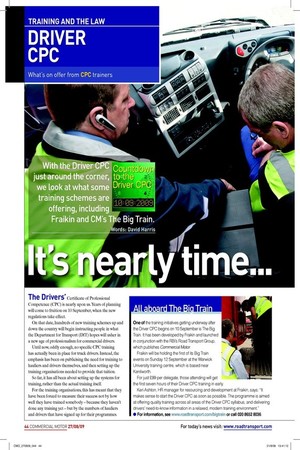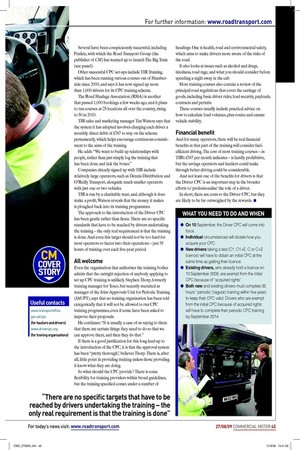TRAINING AND THE LAW
Page 48

Page 49

If you've noticed an error in this article please click here to report it so we can fix it.
DRIVER CPC
What’s on offer from CPC trainers
With the Driver CPC just around the corner, we look at what some training schemes are offering, including Fraikin and CM’s The Big Train.
Words: David Harris
It’s nearly time...
The Drivers’ Certiicate of Professional Competence (CPC) is nearly upon us. Years of planning will come to fruition on 10 September, when the new regulations take effect.
On that date, hundreds of new training schemes up and down the country will begin instructing people in what the Department for Transport (DfT) hopes will usher in a new age of professionalism for commercial drivers.
Until now, oddly enough, no speciic CPC training has actually been in place for truck drivers. Instead, the emphasis has been on publicising the need for training to hauliers and drivers themselves, and then setting up the training organisations needed to provide that tuition.
So far, it has all been about setting up the systems for training, rather than the actual training itself.
For the training organisations, this has meant that they have been forced to measure their success not by how well they have trained somebody – because they haven’t done any training yet – but by the numbers of hauliers and drivers that have signed up for their programmes. Several have been conspicuously successful, including Fraikin, with which the Road Transport Group (the publisher of CM) has teamed up to launch The Big Train (see panel).
Other successful CPC set-ups include TIR Training, which has been running various courses out of Humberside since 2000, and says it has now signed up more than 1,000 drivers for its CPC training scheme.
The Road Haulage Association (RHA) is another that passed 1,000 bookings a few weeks ago, and it plans to run courses at 25 locations all over the country, rising to 50 in 2010.
TIR sales and marketing manager Tim Watson says that the system it has adopted involves charging each driver a monthly direct debit of £7.67 to stay on the scheme permanently, which helps encourage continuous commitment to the aims of the training.
He adds: “We want to build up relationships with people, rather than just simply log the training that has been done and tick the boxes.” Companies already signed up with TIR include relatively large operators, such as Dennis Distribution and O’Reilly Transport, alongside much smaller operators with just one or two vehicles.
TIR is run by a charitable trust, and, although it does make a proit, Watson reveals that the money it makes is ploughed back into its training programmes.
The approach to the introduction of the Driver CPC has been gentle rather than ierce. There are no speciic standards that have to be reached by drivers undertaking the training – the only real requirement is that the training is done. And even this target should not be too hard for most operators to factor into their operations – just 35 hours of training over each ive-year period.
All welcome
Even the organisation that authorises the training bodies admits that the outright rejection of anybody applying to set up CPC training is unlikely. Stephen Thorp, formerly training manager for Tesco, but recently recruited as manager of the Joint Approvals Unit for Periodic Training (JAUPT), says that no training organisation has been told categorically that it will not be allowed to run CPC training programmes, even if some have been asked to improve their proposals.
He continues: “It is usually a case of us saying to them that there are certain things they need to do so that we can approve them, and then they do that.” If there is a good justiication for this long lead-up to the introduction of the CPC, it is that the approval system has been “pretty thorough”, believes Thorp. There is, after all, little point in providing training unless those providing it know what they are doing.
So what should the CPC provide? There is some lexibility for training providers within broad guidelines, but the training speciied comes under a number of headings. One is health, road and environmental safety, which aims to make drivers more aware of the risks of the road.
It also looks at issues such as alcohol and drugs, tiredness, road rage, and what you should consider before spending a night away in the cab.
Most training courses also contain a review of the principal road regulations that cover the carriage of goods, including basic driver rules, load security, payloads, contracts and permits.
These courses usually include practical advice on how to calculate load volumes, plan routes and ensure vehicle stability.
Financial benefit
And for many operators, there will be real inancial beneits in that part of the training will consider fueleficient driving. The cost of most training courses – as TIR’s £7.67 per month indicates – is hardly prohibitive, but the savings operators and hauliers could make through better driving could be considerable.
And not least one of the beneits for drivers is that the Driver CPC is an important step in the broader efforts to ‘professionalise’ the role of a driver.
In short, there are costs to the Driver CPC, but they are likely to be far outweighed by the rewards. ■
All aboard The Big Train
One of the training initiatives getting underway after the Driver CPC begins on 10 September is The Big Train. It has been developed by Fraikin and launched in conjunction with the RBI’s Road Transport Group, which publishes Commercial Motor.
Fraikin will be holding the first of its Big Train events on Sunday 12 September at the Warwick University training centre, which is based near Kenilworth.
For just £99 per delegate, those attending will get the first seven hours of their Driver CPC training in early.
Keri Ashton, HR manager for resourcing and development at Fraikin, says: “It makes sense to start the Driver CPC as soon as possible. The programme is aimed at offering quality training across all areas of the Driver CPC syllabus, and delivering drivers’ need-to-know information in a relaxed, modern training environment.”
● For information, see www.roadtransport.com/bigtrain or call 020 8652 8036.
WHAT YOU NEED TO DO AND WHEN
● On 10 September, the Driver CPC will come into force.
● Individual circumstances will dictate how you acquire your CPC.
● New drivers taking a test (C1, C1+E, C or C+E licence) will have to obtain an initial CPC at the same time as getting their licence.
● Existing drivers, who already hold a licence on 10 September 2009, are exempt from the initial CPC because of “acquired rights”.
● Both new and existing drivers must complete 35 hours’ ‘periodic’ (regular) training within five years to keep their CPC valid. Drivers who are exempt from the initial CPC because of acquired rights will have to complete their periodic CPC training by September 2014.


























































